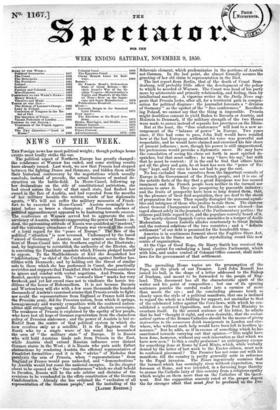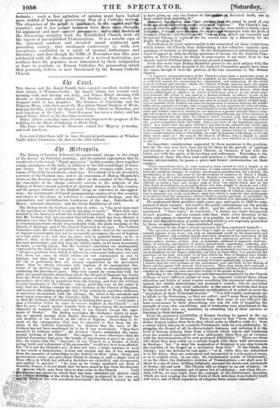The prevailing Home topics are the presumption of the Pope,
and the Rlack of our Premier. Lord Tohn Russell has issued his bull, in the shape of a letter addressed to the Bishop of Durham, and meant to be forwarded to the people of England. This document has all the characteristic spirit of the writer and his point of composition ; but one of its opening sentences puzzles the careful reader into a surmise of more than meets the eye ; and the concluding phrases touch so closely uponthe style of a political manifesto, that one is inclined to re the whole as a bidding for support, not unsimilar to that of the celebrated letter against the Corn-laws, with which he consolidated a scattered Opposition, and drove the Peel Ministry to overt= itself. In the second sentence of his letter' he admits that he had "thought it right, and even desirable, that the ecclesiastical system of the Roman Catholics should be the means of giving instruction to the numerous Irish immigrants in London and else'Where, who without such help would have been left in heathen ignorance." But he adds, as if in excuse of something which he has sanctioned towards carrying out that opinion—" This might have been done, however, without any such innovation as that which we have now seen." Is this a crafty prolusion2 an anticipatory excuse for something done at Rome by Lord Minto, which, while verbally denied by the letter of last week to the Exeter citizen, must now be confessed piecemeal ? The Premier has not come out with his manifesto till the country is pretty generally astir in reference to the Papal invasion. The Times ingeniously surmises that the turmoil which has seemingly risen without expectation, was foreseen at Rome, and was intended, in a farseeing hope thereby to arouse the Catholic laity of this country from a religious apathy which weighs on them more than on the Catholics of the Continent. But the supposition scarcely rated at the proper degree the far stronger effect that must first be produced on the Pro testants : such a free .agitation of opinion must have looked more riskful of heretical perversions than of a Catholic revivol. The eloquence of the pulpit is *Awed, in the clitel aud country ; and it has gained immenae force feom more thought, ful argument and more earnest nerann0On.; 41afluential lendergotC the Dissenting ministry back the Established Church with all the vigour of unestablibhed Protestantism. It is a notable sign of the increased candour and elevated moral sentiment now pervading society, that awakened controversy is, with few exceptions, conducted in a spirit of mutual forbearance and liberality ; and that though the Fifth of November was this year celebrated with all the circumstance of a revived institution, yet nowhere have the populace been stimulated by their indignation or fears to retaliate on Roman Catholics the persecution which they generally believe is now threatened by the Roman Catholic Church.

























